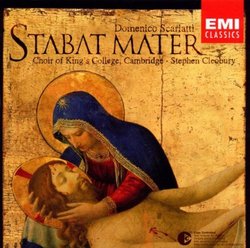| All Artists: Domenico Scarlatti, Stephen Cleobury, Choir of King's College - Cambridge Title: Scarlatti: Stabat Mater/Te Deum/Magnificat; Choir of Kings College, Cambridge Members Wishing: 1 Total Copies: 0 Label: EMI Classics Release Date: 5/6/2003 Genre: Classical Styles: Opera & Classical Vocal, Chamber Music, Historical Periods, Baroque (c.1600-1750), Classical (c.1770-1830) Number of Discs: 1 SwapaCD Credits: 1 UPCs: 724355749826, 724355733122, 072435574982 |
Search - Domenico Scarlatti, Stephen Cleobury, Choir of King's College - Cambridge :: Scarlatti: Stabat Mater/Te Deum/Magnificat; Choir of Kings College, Cambridge
 | Domenico Scarlatti, Stephen Cleobury, Choir of King's College - Cambridge Scarlatti: Stabat Mater/Te Deum/Magnificat; Choir of Kings College, Cambridge Genre: Classical
|
Larger Image |
CD Details |
CD ReviewsScarlatti's masterpiece. Launio Rafaele Kaleva | Helsinki,Finland | 03/04/2006 (5 out of 5 stars) "When we think about the great choral works of classical music, the names we often repeat are Pergolesi, Bach, Mozart, maybe Beethoven and some others. But very rarely does Domenico Scarlatti, the profilic composer of several harpischord pieces, come along. This, in my opinion, is truly a shame, cause one of the greatest music he ever wrote, was choral music. And in this field, his crowning achievement was "Stabat Mater" for unacomppanied voices. It is a gem of a highest order. It has a beautiful structure, and it contains several immortal melodies. I myself put it right up to the greatest choral works ever written.Do yourself a favour and try it, if you love great choral music or beautiful music in general, you wont be disappointed. The perfomance of King's choir in this cd is solid and clear. Highest of recommendations!" A voice teacher and early music fan George Peabody | Planet Earth | 01/01/2010 (5 out of 5 stars) "ONE OF THE MANY ISSUES OF THIS RECORDING 'FLOATING' AROUND UNDER KING'S COLLEGE CHOIR. THE ONLY DIFFERENCE BETWEEN THEM IS THE PRICE, SO CHECK IT OUT.
This is really a fabulous recording in every way: great Scatlatti compositions, inspired singing from the King's College Choir and two excellent soloists who duet and solo off and on throughout the recording. There is some confusion when you try to figure which soloist belongs to which voice, so based upon some knowledge I acquired via email from one of the adult singers in the group, here is what you should know: Nicholas Daly is the very excellent boy soprano and Timothy Mead is the countertenor that is actually not mentioned in the line-up, but his exquisite singing is heard with Daly and in several solo passages. There is a boy alto, who is named incorrectly in the liner notes(unfortunately), but he actually only sings very briefly in one duet passage. I don't know if you feel as I do about wanting to know who is singing what, but I told you anyway! For a musician employed for many years by the church, Scarlatti's surviving output of sacred compositions is surprisingly small. When it comes to the measure of quality, however, most of his twenty or so church works tower above the ordinary. Domenico Scarlatti was writing as a renovator of of tradition in his impressive 'Stabat Mater' for ten parts, composed at Rome in 1715, in a contrapuntal style which, on the surface, seems somewhat archaic. In setting to music the processional chant that relived the Passion, Scarlatti was above all paying homage to the city of his birth. Written for four sopranos, two altos, two tenors, two basses and organ continuo, this 'Stabat Mater' is strikingly lyrical and mature in manner, and also highly melodic, astonishingly modern and has harmony whose richness and beauty remind one of Mozart's last religious compositions. His haunting 'Miserere', preserved in a Vatican Library manuscript, almost certainly touched the hearts of those who attended the legendary service of Tenebrae in the Sistine Chapel during Holy Week. Scarlatti's only surviving 'Magnificat' (in three movements) setting was probably conceived to use within the Vatican. Scarlatti's 'Te Deum' for eight-part choir, written in Portugal in the 1720's, crowned the local tradtion of marking the year's end with a grand service of thanksgiving. The work's vigorous simplicity powerfully projects the famous Latin hymn in praise of God, its structure supported by a so-called 'walking' bass line for cello and organ. 'Laetatus sum', a graceful setting of Psalm 121 in the 'modern' style, was no doubt heard for the first time during the marriage service in January 1729 that united the royal houses of Portugal and Spain. The performance of the King's College Choir is really above reproach as they sing with expertise and inspiration this exquisite Scarlatti music. The soprano voices are crystal clear as they arise in their range effortlessly and beautifully. The male altos provide us with their lush velvety tone quality with just the right volume and the tenors are tuneful and pitch-perfect as they provide some of the middle harmony. Everytime I hear the basses in this group I thank somebody somewhere for providing light-lifting sound, resonant but not 'rumbling'basses. Wonderful sound for wonderful music. The accompanying instrumental ensemble plays tastefully and skillfully and all brought together by the conductor , Stephen Cleobury. My question would be to you appreciators of Early Music: Which 'Stabat Mater' to your prefer, the this one or the 'Pater's'? " |

 Track Listings (18) - Disc #1
Track Listings (18) - Disc #1